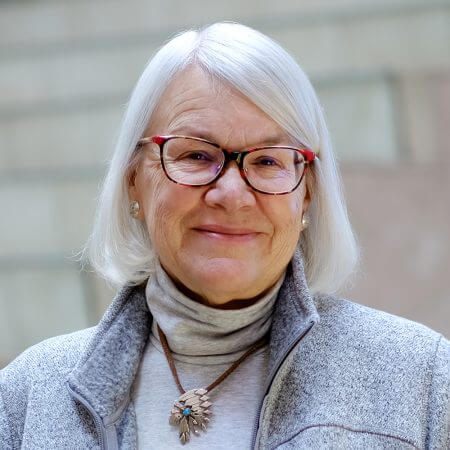
All economic downturns are unique, and today’s is no different. We discuss how investors should approach volatility.
Stabilizing Finances in an Unstable Time
Hollis Walker: This is #NowMe, a podcast for financial advisors who advise women. Hello, this is Hollis Walker with Jan Blakeley Holman, director of advisor education for Thornburg Investment Management, and this #NowMe, a podcast for financial advisors who advise women. It’s a gorgeous spring in Santa Fe, Jan, but I’m afraid a lot of people aren’t able to enjoy spring wherever they are because of the anxiety of the coronavirus, and what’s happening to our money. Tell us what investors and their advisors should be thinking about all of this.
Jan Blakeley Holman: Well, Hollis, you’re right, it is beautiful here, and we’re lucky that we’re in a state that is of low population, so, we don’t have a lot of cases here, and people are spread out, but, it’s certainly a frightening situation all around. As far as what’s happening right now, it is unique. There’s no question about it. We’ve never gone through something like this, but in terms of market shocks, it’s not unique, and what I mean is that all of the market shocks we’ve had, we always feel that this is new and different, and there’s never been anything like it, and, this downturn is not like any other, etc., etc. So, which may mean that they’re all unique in their own way. The economy is cyclical, investors have to believe that or understand that, and the reason that’s important is because recessions and downturns happen. Typically, they’re not forced by some bizarre things like a virus or a pandemic, but they do happen regularly, and it’s a normal part of the economic cycle, but what’s really different about this, we have very high unemployment. Many people who are employed are working from home or from someplace else than their office, and it looks like things aren’t going to be normal for some time.
Hollis Walker: So, what do you expect the recovery to look like? Will the market move up smoothly and quickly or do you expect it to look more like the French Alps on a graph?
Jan Blakeley Holman: Well, the market as measured by the S&P 500 may have hit his low on March 23. You know, we don’t know yet. We’re gonna have to see about that. Time will tell. It’s clear that we’re gonna have negative GDP growth in the first quarter and probably in the second quarter which means we are, in fact, in a recession, but we won’t know for sure until the numbers come out in June sometime. What I’d like to think about, in terms of the recovery, is that it’s typically not a straight line going up. It’s gonna be jaggedy as you said, like the Alps. The economy is not really something that investors need to obsess about. It’s interesting to understand how the economy works, but it’s not something that we need to pay very, very close attention to. We don’t need to pay very close attention to the market gyrations either.
Hollis Walker: So, think long term, not short term.
Jan Blakeley Holman: It is long term. When you think about investors, you know, look at it this way, they’re investing the whole time they work, when and if they retire, they’re remaining invested through retirement, so that could be 40, 50, 60 years, so what happens over a 10 month period, a 2 month period, or even a 2 year period, doesn’t really make a difference in terms of their investment portfolio. It may numbers wise, today, but over the long term, it’s not gonna make a difference.
Hollis Walker: So, the person who says, oh, my gosh, I lost $100,000.00 yesterday, in a way, they didn’t lose $100,000.00 unless they’re forced to take that money out.
Jan Blakeley Holman: Well, that’s true, and a very wise financial advisor, who’s become a friend of mine, said that what she’s telling her clients is this: no, you didn’t lose $100,000.00, your account went down $100,000.00, because if I say, I lost $100,000.00, then I’m personalizing it and I’m also formalizing it, so the account may have gone down $100,000.00, but you still have all the shares you had, and if you’re investing in a 401k, where’s money being taken out every 2 weeks, you’re buying more shares, so those will recover.
Hollis Walker: Ah, and the ones you’re buying today might be cheaper than the ones you bought 6 months ago.
Jan Blakeley Holman: Absolutely.
Hollis Walker: So, what else can you tell investors and advisors about how they should be thinking about their money and what they should be doing?
Jan Blakeley Holman: Well, this is an individual situation. What somebody would do if they just lost their job is different than a person who is retired and is living off of Social Security, pension income, annuity income and income from their investment account, so first of all, one size doesn’t fit all. That’s really important to understand. Second, if you have a cash reserve, which hopefully, as an investor you do, that money is there for situations like this. Also, don’t look at your account. Don’t look at the numbers. You don’t need to. The money is there. The value may be fluctuating, but you still have shares. The same number of shares or more shares than you had a month and a half ago. Unemployment is really amazing, in terms of what’s happened. We’re looking at unemployment of about 22 million people in a month. whether or not that will come back immediately is an open question, and for people who have lost their jobs, it can be a very scary time, and what happens with, typically, the clients that our advisors serve is that maybe family members need to borrow money from them because they have lost a job or don’t have money to pay rent and that type of thing. Being aware of all of the different possibilities for different people is really important for advisors, and as individuals, we have to cut our friends some slack because we don’t know what their financial situation is, and we don’t know what they’re going through.
Hollis Walker: Right, and, and I was talking to one of my older friends recently and realizing that he feels that he’s responsible for his adult children and grandchildren because they have lost jobs, and he needs to help them and thank goodness that he has wisely invested and is in a good position and can do that.
Jan Blakeley Holman: That’s totally normal, and we’re gonna see that more and more. Now, what may come out of this is a very disillusioned millennial generation. They might have seen too much of this. The crash or the correction of 2008/2009, and then this, it may make them very skeptical about the stock market, but to be honest with you, investing in equities, are one of the best choices, that an investor can make. I think one thing to think about, too, Hollis, that’s become very clear to me is what this disease is doing for many of us and how we look at people in our lives, it’s a terrible disease, but it’s given us more opportunity to think about our families. Our close family and our extended family, and how much they mean to us. I think it’s given many of us a greater appreciation for teachers and nurses and doctors and emergency healthcare people, and appreciation that we never had before; caregivers and unfortunately, many of those, professions are the ones that are underpaid. Well, if my children were really young right now, and I was having to do my job from home and also oversee their distance learning, I think I would be losing my mind, so maybe this will give us an opportunity to value people in careers that we’ve kind of taken for granted in the past.
Hollis Walker: Well, exactly, and postal workers, that’s one group we should all be grateful for every day.
Jan Blakeley Holman: There’s no question.
Hollis Walker: So, Jan, during this time, you’ll be glad to know that I have not looked at my investment numbers since you told me not to.
Jan Blakeley Holman: Good.
Hollis Walker: And I’ve been saving a lot of money because I’m not eating out as much, but I think I’m gaining weight because I’m cooking and baking and eating so much. That seems to be my new hobby, just cooking, baking, eating, repeat.
Jan Blakeley Holman: Right, right, rinse, repeat. Right.
Hollis Walker: Right, what are, what are you doing to keep yourself busy? I know you’re still working, obviously.
Jan Blakeley Holman: Yeah, still working. I have two, as you know, I have two 2 year-old dogs, I thought when I bought them, I purchased them already trained, but I found out that that wasn’t the case. So they’re running around the house, creating havoc, and I’m doing a lot of guitar playing. You’ll like this, Hollis. A couple of weeks ago, I was in a guitar class, a virtual guitar class with my guitar teacher, and three 13 year-old teenage boys playing Smoke on the Water, so, I’m very busy doing that, and mosaics. Doing mosaics and just sitting outside thinking and breathing and appreciating.
Hollis Walker: I think that, for a lot of us, this timeout, or what’s created partial timeout for some of us, is really reinforcing how much we need to take that time, that quite time, just to be a little more sane.
Jan Blakeley Holman: Absolutely.
Hollis Walker: That’s all the time we have today. You’ve been listening to #NowMe, with me, your host, Hollis Walker, and Jan Blakeley Holman, director of adviser education at Thornburg Investment Management. If you’d like to send us a comment or an idea for a topic, please email us at nowme@thornburg.com. That’s nowme@thornburg.com.
This podcast is for informational purposes only, and should not be relied upon as investment, legal, accounting, or tax advice. It is not intended to predict the performance of any investment or market, and is not a recommendation, offer, or solicitation to buy or sell any security or product, or adopt any investment strategy. Past performance is not an indication of future performance. Investing involves risk including possible loss of the money you invest. Consult your investment advisor before making any investment decisions. The information contained herein has been obtained from sources believed to be reliable. However, Thornburg Investment Management makes no representations or guarantees as to the accuracy or completeness of the information and has no obligation to provide any updates or changes. The views expressed are subject to change and do not necessarily reflect the views of Thornburg Investment Management. This podcast is for your personal and non- commercial use only. You may not use it in any other manner without the prior written consent of Thornburg Investment Management. Thank you for listening.
Discover more about:
More Insights

Observations: The Value of Dividends and Munis to Stoke Income

Observations: Market Concentration and the Fed’s Policy Outlook

Observations: Are Investors Too Complacent?

Avoiding Concentration Risk in AI: Is It Time for a Reality Check?

Investing in Turkey? Opportunities Exist Among All the Challenges

